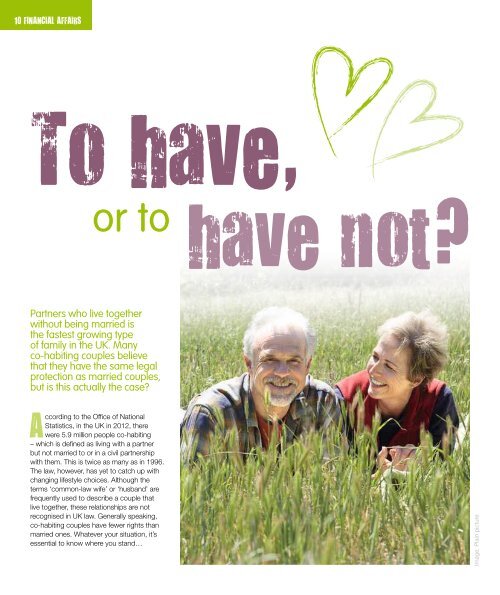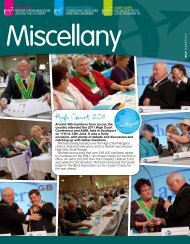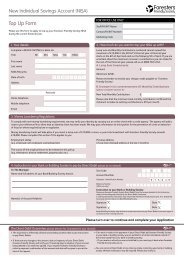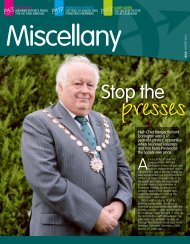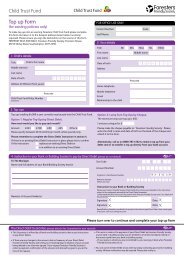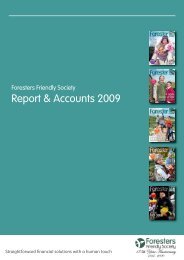Download this issue - Foresters Friendly Society
Download this issue - Foresters Friendly Society
Download this issue - Foresters Friendly Society
Create successful ePaper yourself
Turn your PDF publications into a flip-book with our unique Google optimized e-Paper software.
10 financial affairsTo have,Partners who live togetherwithout being married isthe fastest growing typeof family in the UK. Manyco-habiting couples believethat they have the same legalprotection as married couples,but is <strong>this</strong> actually the case?Aor toccording to the Office of NationalStatistics, in the UK in 2012, therewere 5.9 million people co-habiting– which is defined as living with a partnerbut not married to or in a civil partnershipwith them. This is twice as many as in 1996.The law, however, has yet to catch up withchanging lifestyle choices. Although theterms ‘common-law wife’ or ‘husband’ arefrequently used to describe a couple thatlive together, these relationships are notrecognised in UK law. Generally speaking,co-habiting couples have fewer rights thanmarried ones. Whatever your situation, it’sessential to know where you stand…have not?Image: Plain pictureTHE MONEYLiving togetherIf you and your partner have separate bankaccounts, neither of you can have accessto money held in the other’s account. Ifone partner dies, any balance will be theproperty of their own estate and cannot beused until the estate is settled.If you have a joint account,then both you and yourpartner have accessto the account andif your relationshipends, the money willbelong to both ofyou. On the deathof one partner,the other partnerbecomes entitledto the balance.However, a proportionof the balance will betaken into account whencalculating the value of theestate of the person who has died.THE CHILDRENLiving togetherIf you’re an unmarried mother, you havesole responsibility for a child unless: youregister or re-register the birth of your childwith the child’s father; you make a formalagreement with the father of the child andregister it at a court, known as a ‘parentalresponsibility agreement’; or there is a courtorder in favour of the father.If you’re an unmarried father, you’re notautomatically assumed to be thechild’s father. However, you canget legal responsibility foryour child by: registering(or re-registering) thebirth of your childtogether with thechild’s mother;making a parentalresponsibilityagreement withthe mother andregistering it atcourt; obtaininga court order; or50+ Life CoverWhether or not you’re married,you will want to know that your lovedones’ future is taken care of if you’reno longer there to provide for them.<strong>Foresters</strong> 50+ Life Cover provideslife assurance with guaranteedacceptance, giving youpeace of mind.Child TaxExempt Savings PlanMarriedIf a married couple has a joint bankaccount, the money is owned jointly,regardless of who put it into the account.On the death of one partner, the wholeaccount will immediately become theproperty of the other. Debtsand overdrafts relating toa joint bank accountWhatever the future brings, why notprovide extra financial security for yourchildren or grandchildren by setting upa Child Tax Exempt Savings Plan?Monthly contributions of between £15 and£25 over a fixed term of 10 to 25 years willpay out a cash lump sum, free fromIncome and Capital Gains Tax.will be the responsibilityof both or eitherpartner, irrespectiveof who actuallyincurred them.If each partnerin a marriedcouple has aseparate bankaccount and oneof them dies, thebank may allow theother partner to withdrawthe balance, provided thatthe amount is small.becoming the child’s guardian, whichwould only take effect on the mother’sdeath. Whichever parent the child liveswith, both parents are responsible forsupporting a child financially.MarriedEvery child born to a married woman ispresumed to be her husband’s child, unlessthere is proof to the contrary. A husbandhas the right to enter his name onthe child’s birth certificate,whether or not he isactually the father.Both married parentshave parentalresponsibility fortheir child andresponsibility forsupporting thechild financiallyuntil the child is 18years old. This isthe case even if youseparate or divorce.THE HOUSELiving togetherIf you are the sole owner of a property, youhave a right to stay in the home. However,your partner may be able to claim a‘beneficial interest’ in it – where a courtformally recognises contributions theyhave made towards the home.If your partner is the sole owner, youmay have no rights to remain in the homeif you are asked to leave. However, if youhave children, you can ask a court totransfer the property into your name. Thecourt will only do <strong>this</strong> if it decides it is inthe best interests of your children. Thisis usually done for a limited period, forexample, until your youngest child is 18.If you are joint owners, you and yourpartner have equal rights to stay in thehome. However, if you have children, youcan ask a court to transferthe property into yourname. Again, thecourt will onlydo <strong>this</strong> if itdecides it isin the bestinterestsof yourchildren,usually for alimited period.Legal AdviceHelplineProperty is a complicated areaand, whatever your situation, youshould get expert legal advice.As a <strong>Foresters</strong> member, you havefree access to our Legal AdviceHelpline, seven days a week,365 days a year on0845 676 9484.MarriedBoth married partnershave a right to remain inthe matrimonial home, regardless of whobought it or has a mortgage on it. This isknown as home rights.You have the right to stay in thehome until a court orders otherwise,for example, in the course of a divorcesettlement, where the long-term rightto ownership of the property can bedecided. The court has the power totransfer property regardless of originalownership. However, if you are notseparating legally, the court will only agreeto transfer ownership of a property if it isin the best interests of your children.If you are the sole or joint owner of thehome, your partner will not be able tosell it without your agreement. However,if your partner is the sole owner, you willneed to register your home rights just incase your partner decides to sell up.


